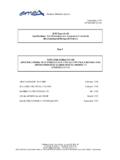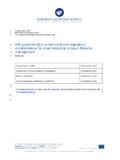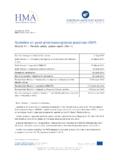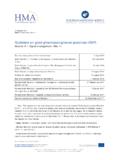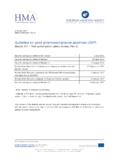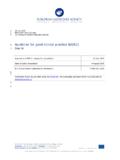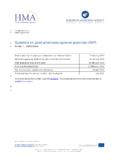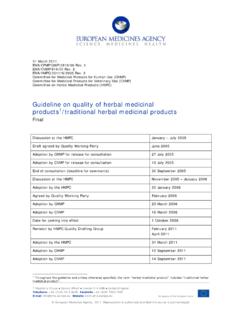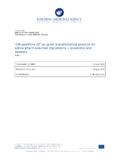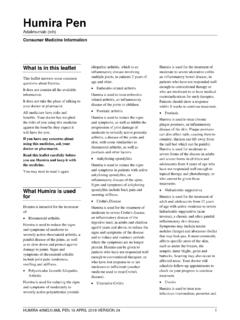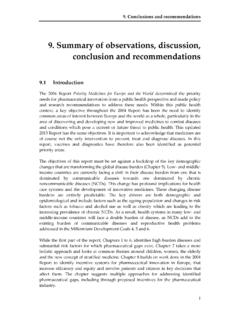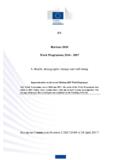Transcription of Rare diseases, orphan medicines - ema.europa.eu
1 28 February 2018. EMA/551338/2017. rare diseases , orphan medicines Getting the facts straight EMA is eager for European citizens with rare diseases to have access to specific and effective medicines . The European Union's orphan legislation has been designed to help overcome the extra hurdles these medicines face to get on the market. Broadly speaking, the orphan legislation foresees giving orphan designation for substances that could be used for treating, preventing or diagnosing a rare and serious condition. orphan designation can help the medicine 's developer advance the medicine to the stage where it can be authorised to be put on the market. Formal approval (marketing authorisation) is needed before a medicine can legally be marketed.
2 Misunderstandings often arise about orphan medicines and how orphan designation is given. The following questions and answers address some common ones. 1. Can I be treated with a medicine for my rare disease as soon as it is given orphan designation? No. orphan designation does not itself permit the use of a medicine . orphan designation simply signals that the medicine looks promising. There might be little or no proof that it works in patients. Only when the medicine is given its marketing authorisation can you be sure that the medicine has EMA's confidence that it works and is acceptably safe. Generally, the application for orphan designation comes quite early in the medicine 's development .
3 The medicine is considered for marketing authorisation only when enough evidence of its effects has built up. Exceptionally, a doctor might consider using the medicine before it has its marketing authorisation, for example through a compassionate use program. When contemplating use of a medicine that does not have marketing authorisation, the patient and the doctor need to be fully convinced that there is no other suitable treatment option (including leaving the condition untreated). In some cases, it might be possible to enrol on a clinical trial set up to test the medicine 's effects on patients. Clinical studies, including ongoing ones, are listed in: EU Clinical Trials Register and 30 Churchill Place Canary Wharf London E14 5EU United Kingdom Telephone +44 (0)20 3660 6000 Facsimile +44 (0)20.
4 Send a question via our website An agency of the European Union European medicines Agency, 2018. Reproduction is authorised provided the source is acknowledged. 2. Does orphan designation speed up development time and marketing authorisation? Not necessarily. Giving orphan designation helps ensure that medicines for rare diseases are developed at all, and not necessarily to speed up such development . We have no evidence that having orphan designation leads to shorter development time or quicker evaluation for marketing authorisation. 3. Does the same committee consider orphan designation and marketing authorisation? Two separate EMA committees are involved with orphan designation and marketing authorisation.
5 The Committee for orphan Medicinal Products (COMP) evaluates applications for orphan designation and it also considers if medicines previously granted orphan designation can continue to be classified as orphan medicines at the time of marketing authorisation. Applications for marketing authorisation go before the Committee for Medicinal Products for Human Use (CHMP). Both committees' recommendations are sent to the European Commission which makes the final decision on granting orphan designation on the one hand or marketing authorisation on the other. EMA publishes its recommendations on its website either under rare disease ( orphan ) designations' or under European public assessment reports'.
6 4. Does orphan designation granted outside the EU count in the EU? No, because orphan designations are granted by different authorities and the rules for designation vary. So, a medicine may be classified an orphan in the EU but not necessarily so elsewhere, and the other way round. For example the definition of what is considered rare ( prevalence threshold') is different in the United States (US) from that used in the EU. And in the EU the developer might have to show that the medicine brings significant benefit but this does not apply in the US. 5. What is significant benefit'? Significant benefit means that a medicine produces a clinically relevant advantage or makes a major contribution to patients' care, compared with existing methods to treat the condition.
7 Thus orphan designation is given to a product that will improve patients' current treatment, having considered what else is available (see also Q. 6). 6. How is the assessment for significant benefit' different from that for benefit risk'? When other treatments already exist for the condition, the application for orphan designation has to show that the candidate medicine brings significant benefit compared with those treatments. For example, an orphan medicine may be suitable for patients for whom current treatments do not work, or by adding it to current treatment it is likely to improve patients' outcome. A medicine can also be said to show significant benefit if it works as well as other treatments but is significantly easier or more convenient to use.
8 By contrast, for a benefit risk assessment in a marketing authorisation, the application has to show that the candidate medicine 's benefit (how well it works) outstrips its risks (its known and possible side effects). A medicine 's benefit risk assessment often involves comparison with other treatment but there is no obligation to show that the candidate medicine is more beneficial than all other methods for treating the condition. rare diseases , orphan medicines EMA/551338/2017 Page 2/4. 7. For authorised medicines , why is the medical condition in the orphan designation not always the same as that in the marketing authorisation? The medical condition specified in the orphan designation is often broader than the use ( indication').
9 For which the medicine eventually gets marketing authorisation. This is because the marketing authorisation indication is based on the evidence that the company gives in its application. Generally, the authorised indication is based on the characteristics of patients in the clinical trials and might exclude certain groups like the very young or pregnant women, or it might include patients with only one variant of the condition. For example, a medicine originally designated orphan for cystic fibrosis might subsequently be authorised for use only in those aged over 12 years with a specific mutation (change) in the CFTR gene (reflecting studies showing positive outcome in this group), rather than for all patients with cystic fibrosis.
10 8. Who secures availability of an orphan medicine in the EU and sets prices? National authorities in individual EU countries, together with the company, make arrangements for the local availability of all medicines (including orphan medicines ) as well as their pricing. EMA is not involved in the supply and reimbursement of medicines . EMA's principal remit is to ensure that authorised medicines work, they are acceptably safe and are of good quality. And in the case of orphan medicines , EMA assesses the application to ensure that the medicine benefits patients with rare diseases . EMA evaluations are based on a scientific assessment of all available evidence on medicines but do not consider their costs.
